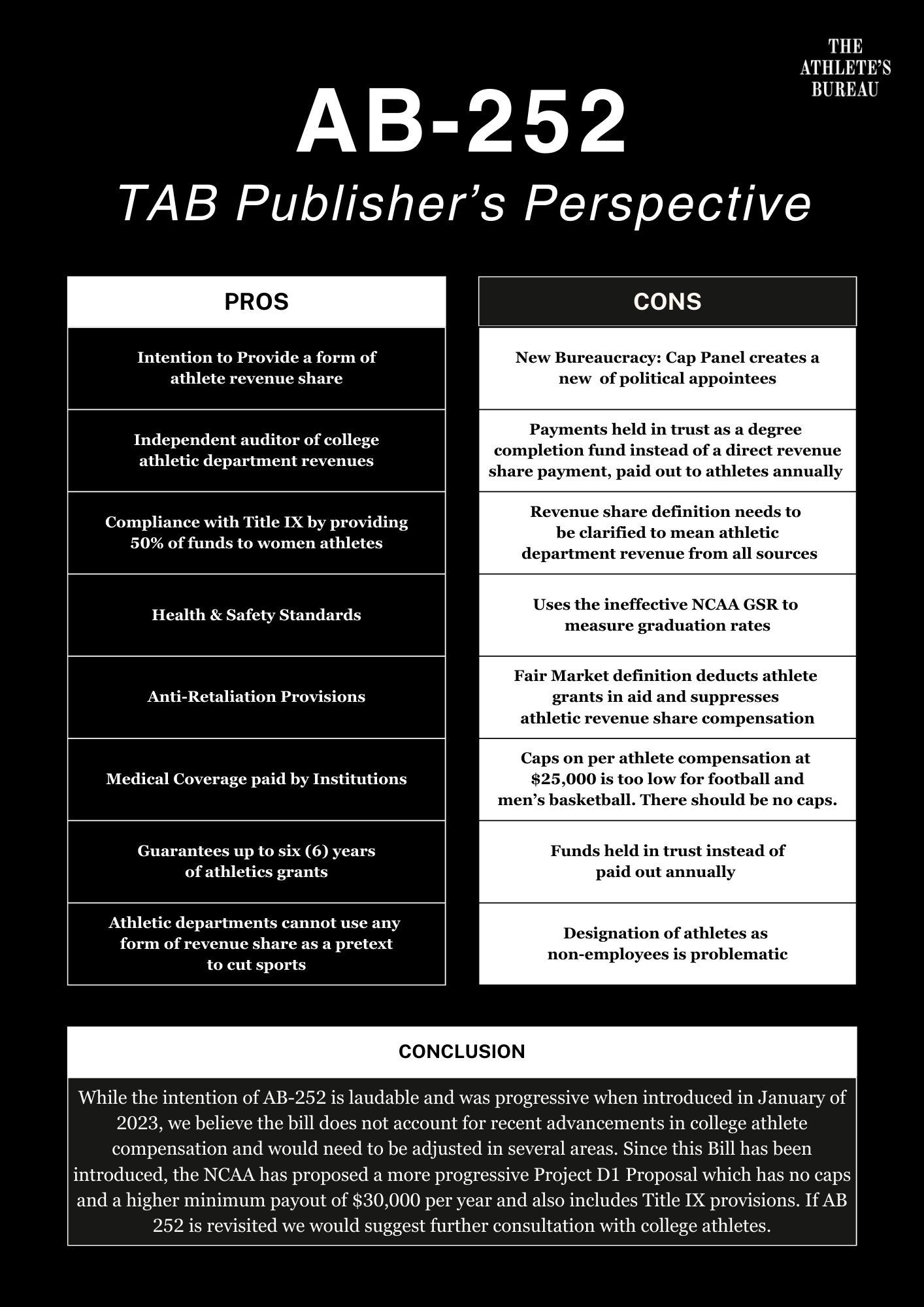State Legislation Update: The College Athlete Protection (CAP) Act
The latest on the California State legislature bill that requires colleges to revenue share with college athletes (via degree completion funds). The bill is the first of its kind in the nation.
Five years ago, California became the first state to allow student-athletes to profit off of their name, image and likeness, forever changing the landscape of college sports. Now, California lawmaker Chris Holden hopes to build on that momentum, introducing a bill that would require Division 1 universities to pay their student-athletes.
Assemblymember Holden first proposed this revenue sharing model back in January 2023 when he introduced AB-252, The College Athlete Protection (CAP) Act. Though the bill was passed by the California Assembly in June, Holden decided to hold the bill to garner more feedback from the chair of the Senate Education Committee and stakeholders within the higher education community. However, Holden told The Athlete’s Bureau that the bill as written is already a compromise.
“There’s not much room left to change the bill without watering it down which I will not do,” Holden said in an email. “CA college athletes deserve better.”

So what exactly do athletes deserve? According to Holden, San Diego State basketball player turned legislator, they deserve 50% of their team’s revenue, or up to $25,000 annually.
If passed, the bill would require NCAA Division 1 institutions of higher education to put all revenue they make beyond revenue reported for the 2021-22 academic year into a degree completion fund. That fund would then be split in half, with an equal amount designated to men’s and women’s sports.
From there, the fund would be allocated to student athletes who receive an athletic grant based on their fair market value compensation. Such compensation is calculated per team by subtracting the team’s aggregate athletic grants from 50% of the team’s revenue from the previous academic year and dividing that difference by the number of grants that athletes on that team receive.
Once an institution has paid all athletes fair market value compensation, the bill states they can use any remaining revenue from other purposes.
Limitations on student athlete compensation include a cap at $25,000 per year and—in lieu of a “severe medical condition” that prevents them from completing their baccalaureate degree program—students must complete their degree within six years.
As for the institution of higher education, the bill states that they may not cancel or reduce athletic grants as a result of compensation, lack of participation due to injury, or poor athletic performance. They are also prohibited from reducing funding for academic, medical, mental health, athletic training, or nutritional support.
In addition, institutions may not eliminate any intercollegiate athletics sport that existed during the 2021-22 academic year, nor can they eliminate any roster slots on those teams.

If passed, the provisions of the bill would be administered by the CAP Panel, a panel of 21 appointed individuals, including four former college athletes.
Though revenue sharing has garnered the most attention, the bill also targets a few other areas of intercollegiate athletics.
For one, the bill would require a CAP subpanel to develop, adopt, publish and enforce health and safety standards geared toward preventing serious sports-related injuries, abuse, health conditions, and death.
The bill also states that institutions reporting revenues of $20 million or more shall pay for all out-of-pocket sports-related medical expenses of their athletes during and for two years after they leave college athletics.
Despite opposition from the University of California, California State University, and Team USA, Holden said he anticipates the bill will move forward. However, whether it will advance in its current form remains up for debate.
~~~~~~~~~~
Are you a student-athlete with an opinion on the bill? If so, we’d love to hear from you. Email author Veronica Roseborough at vlroseborough@gmail.com with your opinions or to set up an interview.
Subscribe to The Athlete’s Bureau to stay up to date on the bill’s progress.
Read the full text of the bill here.
Veronica Roseborough (University of California, Berkeley '24) has worked as a journalist for seven years, covering K-12 and higher education. Previously, she has written for The Hill, The San Francisco Examiner and The Daily Californian.





